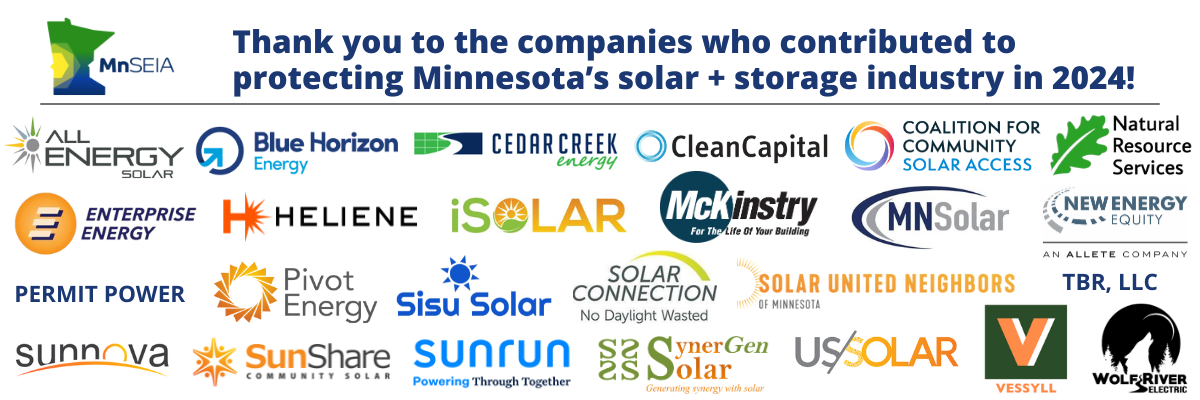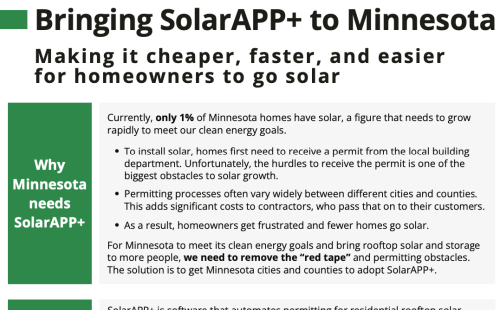Updated in June 2024
Clean energy is having its moment in Minnesota. After a historic Legislative Session in 2023 where over $81 million in solar and energy storage incentives were successfully passed, the industry had high hopes for 2024. Despite a hectic end to a legislative session, MnSEIA and our partners worked to help stakeholders hold together a robust energy bill and ensure solar provisions stayed alive in the final conference committee report.
All of MnSEIA’s top priorities were included in the SF 4942 which passed the Senate in a bipartisan 36-31 vote and the House 70-11. The industry-wide bill makes several important policy changes and investments in key solar initiatives, including:
Interconnection:
- Establishes a cost-sharing fund to improve interconnection delays.
- The legislation directs the Public Utilities Commission (PUC) to develop a program where developers pay fees to fund distribution scale grid enhancements to improve interconnection timelines and make our electric grid more resilient.
- Learn more in the Session Daily article here.
- Re-establishes an ombudsperson role at the PUC to help address interconnection disputes, convene stakeholder groups, review utility interconnection policies, and more.
Small-Scale Solar:
- $2 million for grants to incentivize local governments to adopt the SolarAPP+ platform.
- SolarAPP+ is a web-based automated solar and storage permitting tool developed by the National Renewable Energy Laboratory (NREL.) SolarAPP+ issues permits automatically for eligible small-scale solar systems with same-day approvals.
- The funding includes $1.5 million from Minnesota’s Renewable Development Account for communities inside Xcel Energy's service territory and $500,000 from the general fund for outside Xcel’s territory. Local governments can receive incentives ranging from $5,000 to $20,000 to implement SolarAPP+.
- $50 million for Xcel Energy’s Solar*Rewards program, a historic extension that brings long-term certainty and stability to the small-scale solar market in Minnesota.
- Starting in 2026, the legislation secures $5 million annually for ten years from the state’s Renewable Development Account. This is the longest extension the popular program has ever received.
Permitting reform:
- Permitting reform to streamline and expedite large-scale transmission projects that will ensure utilities meet Minnesota’s 100% by 2040 carbon-free goals.
Other energy-related provisions included in the bill are:
- $6 million in funding for the Sabathani Community Center geothermal system;
- $500,000 for thermal energy network site suitability study;
- $500,000 for Dakota County energy efficiency projects;
- $250,000 for grid enhancing technologies plans.
MnSEIA is grateful for the tireless work of bipartisan legislators, advocacy partners, and our members who helped make these wins a reality. A special thanks to Speaker of the House Melissa Hortman, House Majority Leader Jamie Long, and energy committee chairs Representative Patty Acomb and Senator Nick Frentz for passing an industry-wide clean energy bill.
###
About MnSEIA:
MnSEIA is a member-driven 501(c)(6) nonprofit that promotes and protects Minnesota’s solar and storage industries. We advocate in the state legislative and regulatory arenas in a unified and actionable way to move solar + storage forward. Find out more at https://www.mnseia.org.
MnSEIA's ambitious legislative work would not be possible without the support of our members - thank you! We're effective at the Capitol because of the support and voices of our 170+ members. The more members we have standing behind us, the greater impact we can make. If your company is not a MnSEIA member yet, join us!
Stay up-to-date with our work throughout the year by following us on Twitter or LinkedIn.

